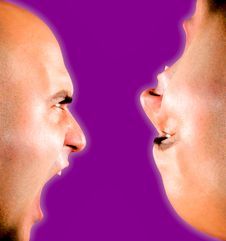Anger
Anger Management or Anger Mastery?
Which is necessary and possible in our “Age of Rage”?
Posted August 20, 2019
Anger is a deeply complex emotion, with many layers, intensities, and reasons for it, some which sort of make sense (you smack your thumb with a hammer while hanging a picture) and some that definitely don’t (you smack your spouse or partner because he or she burned the meatloaf).
Turned inward, anger can lead to depression. Who or what makes you angry and therefore depressed? There are a lot of sources. Turned outward, anger can lead to a trip to the unemployment line, a divorce lawyer, a hospital bed, or a jail cell.
Some people battle this emotion their whole lives, until a heart attack, a stroke, hypertension from high blood pressure, an aneurysm, an ulcer, alcoholism, or an opponent’s fist, knife, bullet, or the hood of the car kills them. Can we say anger causes cancer, autoimmune diseases, or an early death? Not specifically, but it doesn’t help keep those killers at bay either. Untreated anger is a silent killer. Anger-fueled stress kills slowly, over time.
What is the negative impact of anger on your personal and professional lives? We see people express it during road rage, or unintentional or intentional acts of domestic violence or child abuse in their families. They lose their tempers, they “see red,“ and get into physical or verbal fights with their family members, their supposed friends, or strangers they encounter on the streets or in a social setting. When they mix their anger problems with alcohol, their conflicts escalate from no big deal to “the police are here.”
Anger is connected to impatience, self-sabotage of relationships, work projects, and general peace of mind. It impacts people’s perception of you: “Don’t make him or her angry” becomes how people in work and life situations label you.
Impulsive behavior from anger will have consequences for you. What message does it send to your kids if you lose your temper over little things? Regardless of how you might see it, this type of behavior traumatizes children. It doesn’t “toughen them up for the real world”; it makes them fearful or overly-aggressive later on. Your impulsive anger teaches them to respond to life’s stressors and conflicts with others in the same way. If they turn out like you, you only have yourself to blame for this.
There was a 2003 comedy movie called “Anger Management,“ starring Adam Sandler and Jack Nicholson. It was, by all critical measures, not the best effort for either (42% on RottenTomatoes.com). Even the phrase “anger management“ is sort of a loaded one, bringing up visions of court-mandated appointments with a psychologist.
This concept already exists in so-called “Batterers‘ Schools,“ which is often a mandated 52-week group therapy class convicted domestic violence perpetrators have to go once per week as part of their probation. While I applaud the attempt, the design is flawed for the simple reason that the people who hit their spouses or partners often have many other life issues and timely attendance at a court-forced weekly group therapy session is not easy for them to achieve. It’s common for them to miss a few sessions, so the judge says they have violated the terms of their probation and they get put in jail. There needs to be a better way to encourage accountability for their angry, violent behavior.
Perhaps one way to help us get better control of anger is to redefine success differently. How about we coin the phrase “anger mastery“ instead of “anger management“? The first suggests dominance over the emotion that is anger; the second only control over it, however temporary. Use the same phrase when it comes to treating alcoholics. Do we want them to master their addiction to alcohol or merely manage it? I’m not being flippant with the terms; I’m being intentional. Anger mastery, as a concept, is a much better goal for continued success than just anger management.
But can we ever really master an emotion like anger? Perhaps it helps to think of this movement from management to mastery in martial arts terms. Even the most skilled and experienced martial artists never consider themselves as true masters, only as students with more to learn. This means that they practice what they do, over and over, even though they already know it well. The same can be said for longtime meditators or yoga practitioners. They know how to do what they do, but during each meditation session or yoga practice, they ask themselves to be a little better or go a little deeper than the time before. And so it should go with anger; the goal is to be a little better at mastering your anger every day.
If you need clinical help with your anger, don’t wait until your last remaining friend, the HR manager who fired you, or the judge tells you to get it. Find a qualified, licensed therapist, preferably one who specializes in treating anger problems, and start going to the sessions. The life, family, and career you save are your own.
Consider the following time-tested tools to help you on your journey to anger mastery. For them to work, you will need to apply them, every time you feel anger starting to overtake your present moment.
Recognize your hot buttons beforehand.
If it’s other drivers or obnoxious people on the bus or people who bump into you while looking at their phones on the street, know what gets your anger going. If you have an allergy to certain foods, don‘t eat them! Don’t let other people ruin your day with their intentional or unintentional rudeness. Don‘t let other people start an anger momentum inside you. Recognize your growing irritation and redirect it before it‘s too late.
Pause.
Our brains work at one million miles per hour, or so it seems. We can process information in microseconds and we can react to things without realizing the consequences of our forthcoming thoughts turned into words or into actions. Take a pause, even of just a few seconds, before you say something or do something, good or bad. Just wait. Don’t pop off without thinking. Buy yourself the necessary time to put things into context. It’s probably not nearly as bad as it first appeared or sounded. Consider the ancient Zen parable about the warlord who was angry with something one of his underlings had or had not done. His first thought was to kill the man. His next thought was to maim the man. His third thought was to injure the man. His fourth thought was to scream at the man. His fifth thought was to discipline the man. His sixth thought was to speak to the man. His seventh and final thought was to just let it go.
Practice “stress breathing.”
We teach this mind-body, whole-breath focus to cops and firefighters, paramedics and pilots, and anyone else who works in a stressful job. It works because it addresses anger (and the related fears and stressors) somatically. All you need to know to do it well is to be able to count to four. Breathe in for a count of four seconds, hold your breath for a count of four seconds, exhale for a count of four seconds, hold your breath for a count of four seconds. Start with the next inhalation. Do this for a complete cycle of four repetitions. It oxygenates your blood, keeps the blood in your brain, where it belongs (not in your arms and legs, like during fight-or-flight feelings), it drops your blood pressure, lowers your pulse rate, and initiates The Pause you need to make a better decision.
Give up your need to be right or win the argument.
Agree to disagree. Make your point and leave it at that. Don‘t keep adding gasoline to your anger fire or the other person’s. Most arguments are not around life-changing or life-threatening issues. But if you allow your anger to erupt on to another person, you could suddenly find yourself in a life-changing or life-threatening event. People get shot and stabbed by strangers all the time for stupid reasons like, “What are you looking at?“ or “What did you just say to me?“

A pro baseball player at the plate gets beaned with a pitch to the ribs. The coaches and his fellow players encourage him to “walk it off“ down to first base. In other words, tell your story while you‘re underway. Get out of any escalating anger situation under your own power and get away from your own need for control. It‘s not cowardly to walk away; it’s smart. You don‘t have to have the last word. You don’t need to win every verbal battle. If you feel your buttons getting pushed, if The Pause is not working, if you can‘t get control of your body or your brain, get out of there.
Is anger ever useful? In context, yes. The feelings of anger can motivate us to do something differently or to be better next time. It can provide motivation. It can energize us to make a change. It can even protect us from danger, by helping us defend ourselves with a bravery we might not have had while calm. But even if all those are true, the downsides to unmastered anger are never worth it. Get yourself on the path to Anger Mastery.




